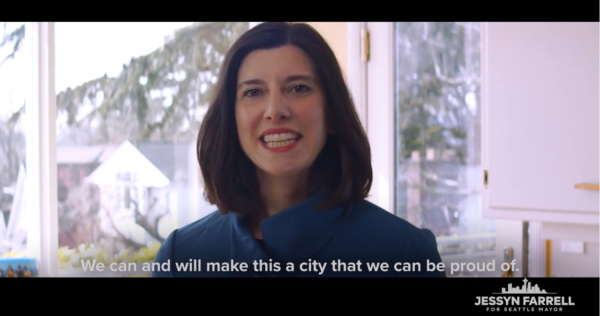
Former Democratic state lawmaker Jessyn Farrell, who served in the Washington Legislature from 2013 to 2017 is back in politics again, running for the office of Seattle mayor, and she’s got a big “gun violence prevention plan” as one of her apparent platform planks.
In her four-page plan, Farrell declares, “I will use the Office of the Mayor to advocate at the state, regional and local level for common–sense firearm regulations that get guns off our streets, particularly weapons of war.”
As a former state legislator, the self-acknowledged “progressive who gets things done” should recall Washington has a 36-year-old state preemption statute.
If elected, her literature says she will “Support local and state efforts to enact common sense firearm regulations including: banning assault weapons, requiring permits to purchase firearms, restrictions on magazine capacity, and efforts to centralize background checks to a single point of sale. All of these policy measures would help cities save lives and reduce gun violence.”
It’s the far left gun control wish list.
Farrell is currently a senior vice president at Civic Ventures, described by SeattleMet.com as “a think tank.” It was founded by billionaire Nick Hanauer and describes itself on its website as “a small group of political troublemakers devoted to ideas, policies, and actions that catalyze significant social change.”
Hanauer is also a founder of the Seattle-based Alliance for Gun Responsibility, a gun prohibition lobbying group that has successfully bankrolled gun control initiatives since 2014 requiring so-called “universal background checks” that haven’t prevented two high-profile shootings in 2016, and restricts ownership of so-called “semiautomatic assault rifles” to persons over age 21 who undergo (and provide proof of) firearms training.
The definition of a “semiautomatic assault rifle” contained in Initiative 1639, passed in 2018, literally applies to every self-loading rifle ever manufactured anywhere on the planet.
Interestingly, in the years following enactment of the two initiatives, Seattle’s murder statistics have climbed. In 2015, the first year after I-594 became law, Seattle logged 26 homicides. In 2016, the number dropped to 19 but shot right back up in 2017 to 27 slayings. In 2018—the year I-1639 was passed by voters—Seattle police reported 32 homicides, and in 2019, the body count crept up to 35.
But last year was a bell-ringer with 52 murders logged by Seattle Police. Instead of a “summer of love” as predicted by retiring Seattle Mayor Jenny Durkan in reaction to the “mostly peaceful” demonstrations that brought to the city the infamous “CHOP” zone, 2020 was a year of mayhem. Some 200 police officers have quit the department, according to various published reports.
Farrell’s “gun violence prevention plan” envisions a world with “zero gun violence.” She mentions the term “gun violence” repeatedly. It is a term Second Amendment advocates say was invented to demonize firearms and shift the blame for violent crime from the perpetrator to the gun.
She would establish a Seattle Office of Violence Prevention. Her plan says this office would “invest in year round public education, research gun violence as a public health crisis, act as a grant making authority to scale up effective community violence prevention programs, and oversee the implementation of life saving measures across city, state, and regional boundaries.”
Whether Farrell’s message resonates with Jet City voters remains to be seen.